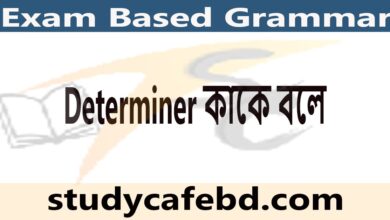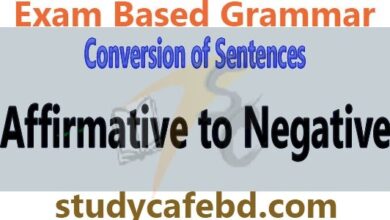Tag Question কাকে বলে ও Tag Question গঠনের নিয়ম?
Table of Contents
Tag Question কি এবং Tag Question এর সহজ নিয়ম?
Tag Question কাকে বলে?
কোন প্রশ্নের উত্তরের সমর্থনে বাক্যের শেষে হ্যাঁ সূচক বা না সূচক যে কথা যোগ করা হয় তাকেই Tag Question বলে।
প্রকৃত অর্থে, Tag Question বাক্যকে আলংকারিক করে।
যেমন:
- We like flowers, don’t we?
- Rina is not come, has she?
Tag Question এর নিয়ম
নিম্নে Tag Question গঠনের ব্যতিক্রম কিছু নিয়ম দেয়া হল।
Rule-1:
প্রদত্ত Sentence অপরিবর্তিত অবস্থায় বসে + Comma(,) বসে + Tag question বসে + Note of interrogation বসে (?)।
Rule-2:
Positive sentence ( হ্যাঁ বোধক বাক্য) এর সাথে Negative tag এবং Negative sentiment (না বোধক বাক্য) এর সাথে Positive tag বসে।
example:
- Roja is an honest girl, isn’t she?
- She does not like sweet, does she?
Rule-3:
Tag question এর Subject সবসময় Pronoun হয়।
Example:
- Birds fly in the sky, don’t they?
Rule-4:
Tag Question গঠনের সময় ব্যবহৃত Auxiliary কে সহকারি Verb বা operator বলে।
এ ধরনের Operator গুলো হল: am, is, are, was, were, shall, will, can, could, may, might, must, has, have, had, do, does, did, ought, dare, need etc.
Rule-5:
Short form of negative tag:
[su_table responsive=”yes”][su_table]| am not | aren’t |
| is not | isn’t |
| was not | wasn’t |
| shall not | shan’t |
| can not | can’t |
| might not | mightn’t |
| have not | haven’t |
| do not | don’t |
| did not | didn’t |
| dare not | daren’t |
| are not | aren’t |
| were not | weren’t |
| will not | won’t |
| may not | mayn’t |
| has not | hasn’t |
| had not | hadn’t |
| does not | doesn’t |
| ought not | doesn’t |
| need not | needn’t |
Rule-6:
সাহায্যকারী Verb যুক্ত Positive tag এর নিয়ম:
প্রদত্ত Sentence টি অপরিবর্তিত অবস্থায় বসে + Comma (,) + প্রদত্ত Sentence এর সাহায্যকারী verb + n’t বসে + উক্ত Sentence এর Subject টি পুনরায় বসে + Note of interrogation ( প্রশ্নবোধক) চিহ্ন বসে।
Example:
- Kajal is a liar, isn’t he?
- Hasan, Kamal and Raju are not students, are they?
Rule-7:
সাহায্যকারী verb যুক্ত Positive tag এর নিয়ম:
প্রদত্ত Sentence টি অপরিবর্তিত অবস্থায় বসে + Comma (,) + প্রদত্ত Sentence টি Present tense হলে Subject ও Person অনুযায়ী don’t/doesn’t এবং Past tense হলে didn’t বসে + প্রদত্ত Sentence এর subject পুনরায় বসে + Note of interrogation চিহ্ন বসে।
Ex:
- Shohel reads a book, doesn’t he?
- We play cricket, don’t we?
- Tazin sang well, didn’t she?
Rule-8:
Negative Tag এর নিয়ম:
প্রদত্ত Sentence টি অপরিবর্তিত অবস্থায় বসে + Comma (,) + প্রদত্ত Sentence এর সাহায্যকারী verb + উক্ত Sentence এর Subject বসে + Note of interrogation বসে।
Ex:
- He will not go to college, will he?
- The boy does not play. does he?
- Apu has not done the work, has he?
Rule-9:
মুল verb দিয়ে শুরু Imperative Sentence কে Tag Question এ পরিবর্তনের নিয়ম:
প্রদত্ত Sentence টি অপরিবর্তিত অবস্থায় বসে + Comma (,) + Won’t/ will you/ could you/ can you/ can’t you/ would you বসে + Note of interrogation বসে।
নোট: যখন শ্রোতার সম্মতি আহব্বান করা হয় তখন won’t you বসে। যখন কোন কিছু করতে বলা হয় তখন Will you/could you/ can you/ would you + ? বসে।
Ex:
- Open the door, won’t you?
- Open the door. will you?
Rule-10:
Don’t দিয়ে শুরু Imperative Sentence কে Tag Question এ রুপান্তরের নিয়ম:
প্রদত্ত Sentence টি অপরিবর্তিত অবস্থায় বসে + Comma (,) + Will You বসে + Note of interrogation বসে।
Ex:
- Don’t forget me, will you?
Rule-11:
let’s দিয়ে শুরু Imperative Sentence কে Tag Question করার নিয়ম:
প্রদত্ত Sentence টি অপরিবর্তিত অবস্থায় বসে + Comma (,) + shall we বসে + Note of interrogation বসে।
Ex:
- Let’s do the work, shall we?
Rule-12:
Be verb যুক্ত Exclamatory কে Tag question করার নিয়ম:
প্রদত্ত Sentence টি অপরিবর্তিত অবস্থায় বসে + Comma (,) + isn’t/aren’t বসে + Subject টি বসে (Subject Noun হলে তার Pronoun form বসে) + Note of interrogation বসে।
Ex:
- How fine the flower is, isn’t it?
Rule-13:
মুল verb যুক্ত Exclamatory কে Tag question করার নিয়ম:
প্রদত্ত Sentence টি অপরিবর্তিত অবস্থায় বসে + Comma (,) + don’t/ doesn’t/ didn’t বসে + Subject টি বসে + Note of interrogation বসে।
Ex:
- How sweetly the bird sings, doesn’t it?
Rule-14:
Subject ‘I’ যুক্ত positive statement কে Tag Question রুপান্তরের নিয়ম:
Ex:
- I am happy, aren’t I?
Rule-15:
Subject ‘There’ যুক্ত Positive statement কে Tag Question রুপান্তরের নিয়ম:
ex:
- There were many problems, weren’t there?
- There were not many problems, were there?
Rule-16:
Need/needs যদি কোন assertive sentence এর Verb হিসাবে ব্যবহৃত হয় তবে Need এর পরিবর্তে Tense ও Person অনুযায়ী Don’t/ doesn’t/ didn’t বসে needn’t এর পরিবর্তে Need বসে।
Ex:
- I need your help, don’t I?
- She needs a pen, doesn’t she?
- You needed a box, didn’t you?
- You needn’t worry, need you?
N.B: কোন Sentence এ need যদি Modal Auxiliary হিসাবে কাজ করে তবে Tag Question এ need এর Modal Auxiliary টি বসে।
ex:
- I don’t need any help from you, do I?
- You need not go, need you?
Rule-17:
কোন Assertive sentence এর Subject যদি Nothing/ anything/ something/ everything হয়, তাহলে Tag question এর Subject হিসেবে এদের পরিবর্তে It বসে।
Ex:
- Life is not certain, is it?
- Everything was gained, wasn’t it?
Rule-18:
কোন Sentence এর Subject যদি everybody/ someone/ anyone/ nobody/ none, somebody, anybody, everyone হয়, তাহলে Tag Question এর Subject হিসাবে এদের পরিবর্তে They বসে।
Ex:
- None can help you, can they?
- Everyone left the place, haven’t they?
Rule-19:
কোন Sentence এর subject যদি all of us/ some of us/ everyone of us/ most of us হয়, তাহলে Tag Question এর Subject হিসাবে এদের পরিবর্তে we বসে।
Ex:
- All of us attended the meeting, didn’t we?
- None of us solve this problem, can we?
Rule-20:
কোন Sentence এর subject যদি all of them/ some of them/ every one of them/ most of them হয়, তাহলে Tag Question এর Subject হিসাবে এদের পরিবর্তে They বসে।
Ex:
- All of them are attentive, aren’t they?
- Most of then were absent, can we?
Rule-21:
কোন Sentence এর subject যদি all of you/ some of you/ everyone of you/ most you হয়, তাহলে Tag Question এর Subject হিসাবে এদের পরিবর্তে you বসে।
Ex:
- Some of you can speak well, can’t you?
Rule-22:
Assertive Sentence এ যদি can, could, may, might, must, ought, dare, need ইত্যাদি Modal Auxiliary থাকে, তবে Tag Question এ ঐ সকল Modal Auxiliary গুলোই ব্যবহৃত হয়।
Ex:
- It may rain today, mayn’t it?
- You should see a doctor, shouldn’t you?
Rule-23:
কোন Sentence এ যদি শুধু ’verb to have’ অর্থাৎ has/ have/ had থাকে এবয় কোন মূল verb না থাকে. তাহলে নিম্নলিখিত উপায়ে Tag Question করতে হয়।
Ex:
- She had a pen, hadn’t she?
- You have a nice garden, haven’t you?
Rule-24:
অনেক সময় Sentence এর মধ্যে Subject ও verb সংক্ষিপ্ত আকারে অবস্থান করে। সেক্ষেত্রে প্রথমে সংক্ষিপ্ত আকারটির প্রকৃত রুপ নির্ণয় করে Tag Question করতে হয়।
Ex:
- I’d meet you, wouldn’t I?
- They’d gone to Dhaka, hadn’t they?
Rule-25:
যদি মুল বাক্যটি Complex Sentence হয় তবে Tag Question টি প্রধান বাক্য (Principle Clause) অনুযায়ী গঠন করতে হবে।
Ex:
- It is found that an ancient king had many wives, isn’t it?





